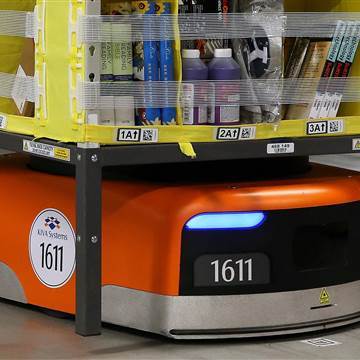As we innovate ourselves away from conventional work and labor, an unlikely question begins to form: How do we feel about free money?
First floated by 16th-century philosopher Thomas More as a “cure for theft,” basic income is finding new life 500 years later amid concerns over technology edging humans out of the workforce. If advanced machines are taking all the jobs, goes the thinking, then how will people earn money to support themselves? A “universal basic income” in which all citizens receive free money from their government — a figurative tax break just for being alive — is a possible solution.
With all members of a society guaranteed some degree of income regardless of employment status, the ideology aims to provide people with some kind of economic anchor if they are unable to earn on their own.
Related: Deep Learning: Teaching Computers to Predict the Future
“We already do this for some kinds of people today,” says Erik Brynjolfsson, director of the MIT Initiative on the Digital Economy and author of “The Second Machine Age.” “Just consider social security, Medicare, and welfare — these are types of basic income. As automation makes society richer — unevenly — then there’s scope for a more generous social safety net.”
SpaceX CEO and founder Elon Musk suggests that universal basic income is the economic tool to deploy in a hypothetically jobless future. His vision of such a time sounds like a hippie dream, in which you pursue your curiosities on an unpaid basis and sustain yourself with free money from the government.
“People will have time to do other things, more complex things, more interesting things. They’ll have more leisure time,” Musk said last month. “We’ll have to figure out how to integrate in a world of advanced AI.”
Related: Is an Alien Structure Causing This Star’s Strange Behavior?
Today, the jobs that evaporate on contact with automation are often mindless-seeming manufacturing and assembly line work, but a company called Momentum Machines brings the issue front and center for the everyday consumer. The brand’s robotic burger cook is capable of filling complex customer orders from scratch without human interaction, and can do so perfectly, nonstop, as long as it has ingredients available.
If Momentum Machines should ever formally release its product, it will likely reshape the fast food industry, and have line cooks looking for new jobs. Smart people predicted that the machines would start to catch up to us; economist John Maynard Keynes wrote in 1930 that the eventual obsolescence of human work will be due to a society’s “means of economizing the use of labor outrunning the pace at which [it] can find new uses for labor.”
Simply put, computers are learning new tricks faster than people are.


After spending $775 million to acquire robotics manufacturer Kiva Systems in 2012, e-commerce giant Amazon has brought 30,000 new package-picking robots into its fold. Wandering aisles all day to fill customer orders, these robots carry out a task formerly executed by paid human employees — no naps, snacks, or bathroom breaks required. In this narrowly defined category of high-quantity-low-quality work, the robots are literally better than people at the job.
A 2013 research paper by the Oxford Martin School estimates that 47 percent of all American jobs are at risk of being automated. This figure includes not only the Amazon-like labor-intensive jobs being outsourced to robots today, but the “at risk” jobs due to disappear soon.
Related: How a Goggle-Wearing Parrot Could Aid Flying Robot Designs
The trucking industry is about to be reimagined in the wake of driverless cars. Indeed, “most workers in transportation and logistics occupations” risk losing their jobs to automation, according to the paper — it’s just too cost-effective to automate the human out of driving. In 2016, a starting trucker earns about $41,000 per year and a San Francisco startup called Otto can retrofit a truck with a driverless system for about $30,000 all-in.


With transformative technologies like artificial intelligence and machine learning poised only to improve over time, the stage is set for even higher-level knowledge work to go to the machines — they’ll soon replace our accountants and our call center operators. They’ll diagnose our diseases. They’ll get better at their tasks with every iteration, until they are able to do certain jobs at least as well as people can.
“It will take a century, maybe two, for machines to take care of all our basic needs, like food, clothing, and shelter. People won’t have to work for that,” says MIT professor Brynjolfsson.
Instead, we will work for other reasons. Some people find a value in work that transcends money, perhaps endowing them with a strong sense of purpose or identity. Voltaire wrote in 1759 that “work saves us from three great evils: boredom, vice, and need.” Some jobs will still be out there for those who pursue them, but they would no longer be essential. You’ll work to preserve some sense of status.
Related: Could One Person Take Down the Internet?
“Humans care a lot about status. It may not be important that you have a boat for getting from A to B, but some will care if it’s a bigger boat than theirs,” Brynjolfsson says. “Certain workspaces in an office are more prestigious locations, certain seats at the table are closer to the head than others. Status is finite by nature, so people compete for it. Keeping a job in a mostly jobless world may be one way to do that.”
A basic income pilot program will kick off next year for 250 residents of Utrecht, Netherlands, and momentum is gathering for a similar program in Fife, Scotland. Jamie Cook, head of the Royal Society of Arts Scotland, told The National, “This is an exciting opportunity for Scotland to look at something quite radical and put the country at the forefront of work in a policy which is getting growing levels of support across Europe.”
Jason Furman is President Obama’s chief economist and chairman of the Council of Economic Advisors, and a noted opponent of instituting universal basic income in response to job automation. In a July speech at New York University, Furman argued in favor of increasing policymakers’ focus on job skills, training, and employment assistance programs as the better place to start.
Related: How Scientists Confirmed One of Einstein’s Controversial Theories
“Replacing our current anti-poverty programs with [universal basic income] would in any realistic design make the distribution of income worse, not better,”…







